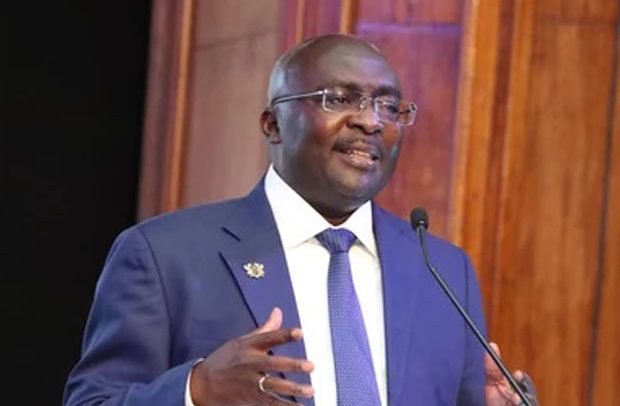Vice President Mahamudu Bawumia
VICE PRESIDENT Mahamudu Bawumia yesterday explained in detail circumstances that led government to run to the International Monetary Fund (IMF) for a bailout to help restore Ghana’s economy to its pre-COVID state.
Dr. Bawumia, who was speaking on ‘The Role of Information Technology Education in Government’s Digitalisation Agenda’ at the Accra Business School, emphasised, “In fact, as I stated in my April 7 lecture, in addition to COVID-19, there were two major items of expenditure that are critical to understanding the evolution of the fiscal deficit and the debt stock: the Banking Sector Clean up (GH¢25 billion) and the Energy Sector Excess Capacity payments (GH¢17 billion). The excess capacity payments of GH¢17 billion relate to a legacy of take or pay contracts that saddled our economy with annual excess capacity charges of close to $1 billion.
Energy Supply Contracts
“These were basically contracts to supply energy to Ghana way in excess of our requirements, but we were obligated to pay for the power whether we use it or not. The excess capacity payments include GH¢7 billion of payments for gas resulting from the previous government signing an off-take agreement for a fixed quantity of gas with ENI Sankofa on a take or pay basis which was way in excess of what was needed at the time. Not keeping up with the excess capacity payments would have meant throwing the country back into a new bout of dumsor.
Banking Sector
“We were also confronted with a banking crisis as a result of the mismanagement of the banking sector. Ghana’s banking system was on the verge of collapse and not dealing decisively with it would have meant disaster for the economy, with millions of people losing their savings.
“Direct COVID-19 expenditure amounted to GH¢12.0 billion, made up of GH¢8.1 billion in 2020 and GH¢3.9 billion in 2021,” the Vice President said.
According to him, the three items of expenditure cumulatively amounted to GH¢54.0 billion (the equivalent of some $7.0 billion), which was borrowed, adding that “the Ministry of Finance estimates that the interest payment on this borrowing for the three items amounts to GH¢8.5 billion annually. This is some 23% of Ghana’s annual interest payments of GH¢37 billion.”
He said to put the expenditure on these three items in perspective, it was important to juxtapose it against the total expenditure (releases) on some of the governments key flagship projects, including Free SHS, One District One Factory, Planting for Food and Jobs, development authorities, Ghana Card, Zongo Development Fund, NABCO, teacher and nursing trainee allowances.
Data Explained
“The data shows that the expenditure on these key flagship programmes over the five-year period between 2017 and 2021 amounted to GH¢15.62 billion compared to the GH¢54.0 billion expenditure on the three exceptional items. The expenditure on the three exceptional items amounted to more than three times the expenditure on the flagship programmes over five years.
“In fact, the annual interest cost of borrowing the GH¢54.0 billion for the three exceptional items would pay for double the annual cost of all the flagship programmes referred to.
“It should be noted that without the GH¢54.0 billion debt for the three exceptional items (COVID-19, Financial Sector and Energy), Ghana’s debt to GDP would be within the sustainability threshold of some 68% instead of the 76.6% at the end of 2021.
“Following the Russia-Ukraine war, energy and food prices skyrocketed globally. For many advanced economies, inflation reached 30-40 year highs. Inflation in Ghana increased to 29.8% in June 2022; Global supply chains were disrupted and shipping costs increased by over 1000%; economic growth slowed down; higher revenue projections in the 2022 budget (based on tax emptions, property rates and the E-Levy) did not materialise,” he added.
Debt Analysis
Dr. Bawumia said the debt sustainability analysis continued to place Ghana at a high risk of debt distress. “There was a Credit Ratings downgrade by international credit ratings agencies; before COVID-19, Ghana was borrowing $3 billion annually from the international capital market; also, following COVID-19, the international capital markets have been largely inaccessible by emerging market countries like Ghana.
“Furthermore, as a result of increases in interest rates in developed economies and increased perceived risk of emerging market economies, investors have pulled $50 billon from emerging market bond funds in 2022 alone.
“Non-resident holders of bonds in Ghana were not rolling over maturities, resulting in a decline in foreign exchange reserves as repatriations increased. With the challenges in accessing the international capital market, balance of payments support was needed to bridge the financing gap, stabilise the economy and create space to implement structural reforms and restore debt sustainability, hence decision to seek IMF support,” he noted.
Current Situation
“I should note again that Ghana has been hit by a quadruple whammy in the last few years: Energy Sector Excess Capacity Payments, Banking Sector Clean-Up, COVID-19, and the Russia- Ukraine war. If you take out the fiscal impact of this quadruple whammy, Ghana will not be going to the IMF for support because our fiscal, debt and balance of payments outlook would be sustainable. Of the four factors, two (COVID-19 and the Russia- Ukraine war) were external and the other two (the banking sector clean-up and the excess capacity payments) were the result of policies of the previous government,” he pointed out.
He added that all over the world, fuel prices were rising in virtually every country, while food prices were rising, inflation has been at a high for many years, currencies are falling in value, fiscal deficits are increasing, and debt levels increasing, among other things.
“This tells us that what we are dealing with is a global phenomenon,” he stressed.
BY Charles Takyi-Boadu


